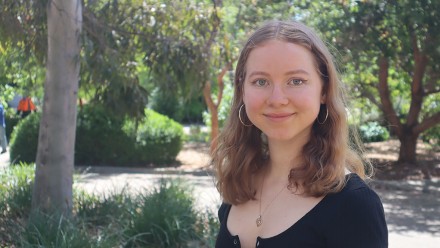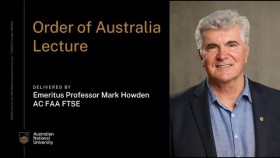Innovating access to local produce
Kayleigh starts our interview by setting two containers of strawberries in front of us. “I want you to try these and see if you can tell which one came from the Farmers Market.” It is not a difficult task. One strawberry is juicy and flavoursome, the other somewhat like cardboard in both flavour and texture. Kayleigh notes that it is not just the quality of items that differs, she herself was surprised to learn that Farmers Market fresh produce can be a lot more affordable than the mainstream supermarket equivalents. She was unsurprised to learn that Farmers Markets deliver a much higher profit margin to small and mid-sized farmers, who may otherwise struggle in a supply chain centred on large-scale industrial farms. These realisations inspired Kayleigh to design a Click & Collect project to make Farmers Market fresh produce more accessible to Canberrans.
Kayleigh Sleath is an undergraduate Bachelor of Engineering Research and Development student at The Australian National University (ANU). Coming from the small coastal NSW town of Culburra Beach, Kayleigh has been passionate about entrepreneurship from an early age. “I love being able to build things that I could actually see being used in the real world,” Kayleigh tells us. Kayleigh’s interest in food systems was sparked by an episode of the podcast, How to Save a Planet, finding it fascinating that “...we could have things set up in a way where the food that we are farming is also doing good for the planet. Not just for us.” Like many young people, Kayleigh is worried about the impacts of climate change. She is particularly concerned about how our long and centralised food supply chains may be impacted by the system shocks that will come more regularly with worsening climate change, sharing the example of empty supermarket shelves in WA towns like Kununurra during the February 2022 floods, or the more widespread shortages experienced during the COVID-19 pandemic. These experiences have made Kayleigh passionate about supporting more local and distributed food production.
“...we could have things set up in a way where the food that we are farming is also doing good for the planet. Not just for us.”
What began as a passion project for Kayleigh, who went out talking to small and mid-sized farmers in both Canberra and back home on the South Coast, has been supported by several opportunities since coming to the University. Kayleigh was involved in the Startmate student fellowship program, which connected her with a group of people interested in building things to solve problems. Kayleigh then represented ANU in, and won, the Australian Business Student Association pitch competition, which helped connect her to some great mentors and advisors. Kayleigh also had the opportunity to participate in the HEX Singapore program, run by the ANU College of Engineering, Computing and Cybernetics. Over two weeks in Singapore, Kayleigh gained access to a network of likeminded young people on the program and developed her project idea. Kayleigh was then able to turn her idea into one of her Engineering Special Topics projects, with Dr Steven Crimp coming on board as her Advisor. Kayleigh was given space at ‘the Hive,’ a collaborative space managed by the ANU School of Computing and was integrated into the growing entrepreneurship culture on campus.
Kayleigh has developed an app, called Ohna, that allows people to look through the produce available at the Capital Region Farmers Market in Canberra and pre-order their groceries. Kayleigh is working with the Market organisers, stallholders, and farmers to pilot this program. She communicates orders to stallholders and farmers, and then goes around the Market early on a Saturday morning to collect and pack these orders. At this point, customers still need to drop into the market between 9 and 11am on a Saturday to pick up their groceries from Kayleigh. However, she believes Ohna allows people who are time-poor and who need to plan and budget their food purchases, like students, to know what is available, at what price, and to be able to collect this food easily. Kayleigh notes that “to be able to access fresh food at those kinds of prices I think is really valuable. It has been for me, it has been for my roommates, and I think will be for more students.” Kayleigh stresses that it is easy for ANU students to access the markets. “You can take the tram if any students are wondering!”
“to be able to access fresh food at those kinds of prices I think is really valuable. It has been for me, it has been for my roommates, and I think will be for more students.”
Dr Crimp, who is Deputy Head of Climate at the ANU Institute for Climate, Energy & Disaster Solutions (ICEDS), thinks that Kayleigh’s project offers participants the same level of flexibility they currently get from large supermarkets, but with a focus on locally sourced produce. He is interested to see whether her Click & Collect option will improve sales volumes and attract new customers to the markets. In the context of climate change, Dr Crimp believes that “improving the proportion of locally sourced produce in our weekly shop can reduce the overall embedded Greenhouse Gas Emissions in the foods we consume,” and notes that this is an important action that individuals and families can take to reduce their carbon footprint. Now available in the app store, customers interested in accessing a local and more climate friendly food shop just need to complete their orders by a Thursday evening for a Saturday market pickup.
Kayleigh’s ambition does not stop here. She would like to leverage her tech experience to see how much can be automated and made more accessible in localising our food chains. Kayleigh envisions a future in which renewable, autonomous vehicles deliver groceries. Kayleigh dreams of “having your fresh produce delivered straight from the farm to your door, it’s zero emissions, zero marginal cost, all the profits go to farmers.” Kayleigh also has some advice for other students and young people with ideas or a desire to make the world better. “Don’t think about it too long, just try it… if it’s going to work, it’s going to work… you can’t really learn things until you start trying.” Kayleigh counsels not to just do things because they are expected of you, but to find something you are passionate about, no matter how small, and work really hard on it.
Are you a Canberra resident interested in piloting the Click & Collect program at the Capital Region Farmers Market? Click here to download the Ohna app.
Written by Ali Thwaites.











